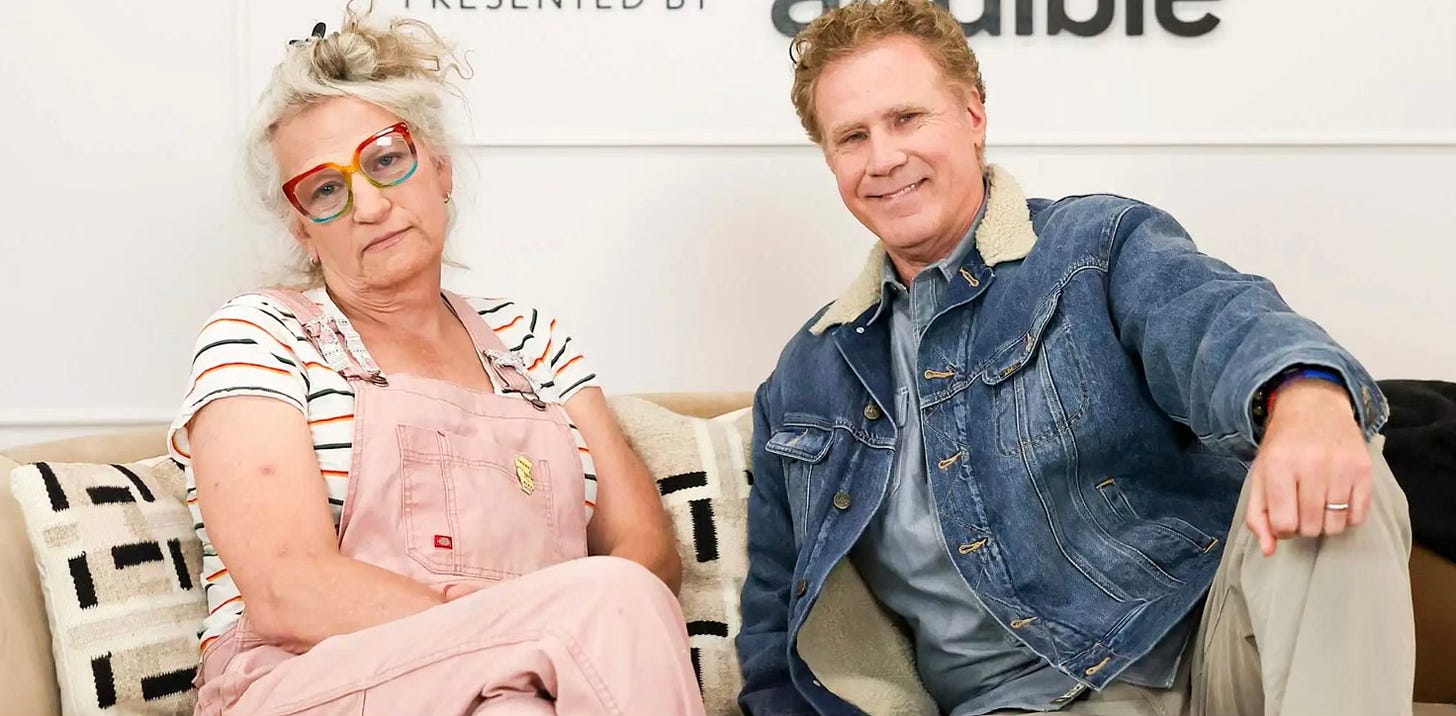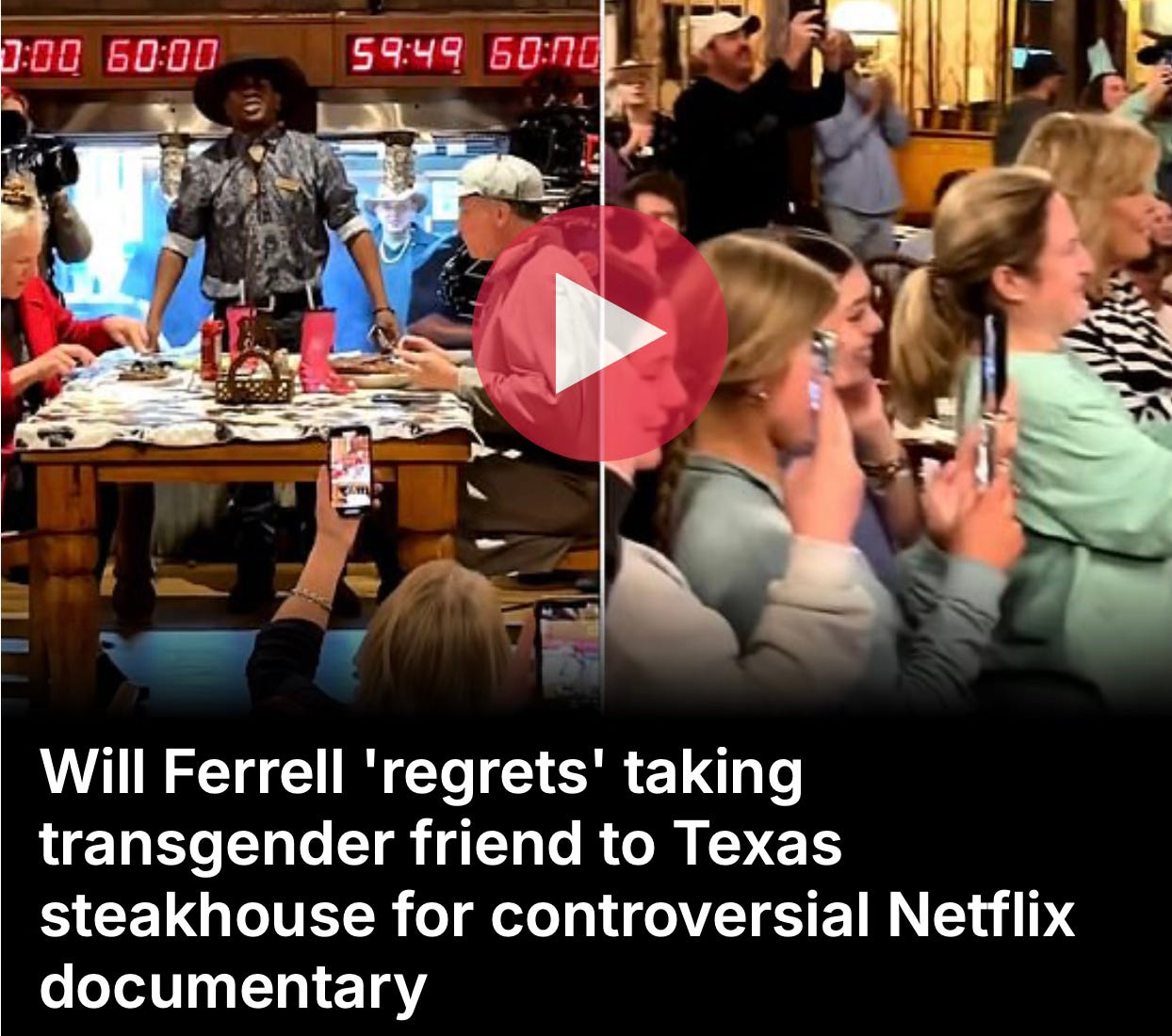
Will & Harper is a beautiful tale of male friendship blossoming over the course of a cross-USA road trip.
Just kidding. Sort of.
I’ve got to be honest: there actually is something touching about the friendship between comedian Will Ferrell and Harper (formerly Andrew) Steele, who made a film about their cross-country bonding exercise following Steele’s coming out as transgender. Taken in isolation, and stripped of any cultural context, it does reveal to the audience what lengths a man (Ferrell) will go to in order to support and validate a friend he clearly has a lot of love for. There are some sweet moments between the two.
But—Will & Harper doesn’t exist in isolation.
It exists during a period when there is an all-out battle between gender ideologues—who currently enjoy vast institutional power—and sex realists, whose valid concerns about the threat posed by gender ideology to women’s rights and child safeguarding are callously, infuriatingly dismissed as bigotry. And so, one cannot view the film without understanding that its emotional valence is, in all likelihood, a clever manipulation. It is part of the machine.
Ferrell is presented as a doofus who knows nothing about transgender people or issues—a portrayal as disingenuous as they come. The two friends do not delve into women’s sex-based rights, or pediatric gender transition. Or women’s sports. Silly Will Ferrell, the whacky comedian, he just wants to support his friend: Look at her! How could you be mean to her? She’s like a little kitten. I’m not buying it—the notion that Ferrell believes the whole issue can be boiled down to “just be nice, there’s no reason not to go along with gender identity claims.”
Steele, who appears miserable and breaks down into tears several times on the trip, promotes the pernicious lie that medical transition is a magic cure for one’s suffering. “Up until the moment I transitioned, I didn’t want to have a gun around,” Harper says. “The moment I transitioned, all I wanted to do was live.”
It goes without saying that it’s a good thing if the man no longer wants to commit suicide. However, his demeanour and words do not match his assertion that transition was a panacea. Later, during a night out in Las Vegas, Steele—again looking profoundly unhappy—tells Ferrell that he’s struggling to accept himself. “Sometimes, the better my makeup looks, the worse I feel about my face… The prettier I get, the more I see the flaws. It’s making me very self-aware of my unfortunately masculine face,” Harper says.
The film ends with Ferrell gifting Steele a set of Tiffany diamond earrings and some words of encouragement: “It’s okay to feel pretty and do nice, pretty things for yourself.” (I agree, feminine men should be okay with their gender nonconformity—but that doesn’t make them literal women.)
As they drive, Ferrell asks Steele who he wants to date, and if that includes other transwomen. There is a suspicious pause. “Sure,” Harper says. Then Ferrell asks about his intention to get “bottom surgery”—i.e. castration and penis inversion. Another pause from Steele. “Possibly.” He says that because he is not “super sexually active,” it doesn’t feel necessary—but he also talks at length about wanting to date and find a relationship. It seems like an excuse. (But hey, I wouldn’t wish that surgery on anyone.)
Will & Harper touches on every expected theme: misgendering; transphobia; peeing in the ladies’; boob jokes (“Was it like heaven right away?” Ferrell asks about waking up after breast implant surgery); women drivers (Harper says he’s become a worse driver since transitioning); and big, scary Republicans (Harper ventures alone into a red state pub, with Trump and confederate flags on the wall and ominous music playing—only to discover that no one really cares that he identifies as transgender).
The pair also gathers a crowd at a Texas steakhouse where Ferrell attempts to eat an enormous steak in one hour so that he can get it for free. Later, the two go on to discover that the public was tweeting nasty comments about them during the meal. Ferrell dramatically claims that he had put his friend’s safety at risk: “We gotta worry about Harper’s safety,” Will says, crying.
Glaringly absent from the film: any mention of autogynephilia (AGP).
While I can’t diagnose Steele, the shoe—a patent leather stiletto—fits. He first wore his sister’s “white, frilly bell bottoms” as a teenager, until another teen called him “faggy”; he came out when he was a middle-aged, married man with two young adult daughters; he told his daughters, in the midst of a divorce, that they might find women’s clothing in his home; he—a New Yorker—bought a house in California so he could stay there and dress in women’s clothing; and he is preoccupied with wondering if others believe that he is a literal woman. All typical of AGP.
It's a disservice to the truth, and even to those advocating for trans rights, to pretend that autogynephilia does not exist—and to pretend that all trans persons are the same insofar as they were simply “born in the wrong body” and possess a gendered soul that does not align with their physicality.
It is this act of pretending—and this embrace of metaphysical gender identity claims—that props up the medical scandal of pediatric gender transition, and that enables people to ignore the explosion of young girls wanting to escape femalehood or lesbianism—both impossibilities—via transition. The denial of AGP also, as far as I can see, leads to the gay males who transition being classified as fetishists—when they are clearly not.
Trans people are not homogenous, despite the narrative regurgitated in Will & Harper.
Two thumbs down.
***
Thanks for reading!
xo
Amy





I really admire the concision of your writing. Substack has a way of bringing out long windedness in authors but that devil is behind you. Well done.
I would add another framing device however. This is another Will Ferrell vehicle; Netflix is famous for throwing truckloads of cash at projects with big stars. How much did they get paid to do a “road trip?” It’s not like a documentary crew found out about the “road trip” and asked if they could tag along. This was a project that was presented to Netflix for approval. Contracts were signed, agents got their cuts, lunches were had. This is a conventional “buddy” movie, like Midnight Run, or Beverly Hills Cop. It cost millions of dollars.
Anyway, thanks for the review. Your insights are great.
I didn't even make it to the halfway mark. What did you make of the story the guy they met up with in the bar just before they arrived at Harper's sister's house? How when he first got to school he sat with the girls, and when the "teacher took us to potty I went into the girls". And how his Mother was called and had to drive to the school to explain to him he was a boy?
I didn't and don't believe a word of the stories of middle aged men who have suddenly found the strength to come out, when they say they knew all their lives. It is demanded of us all to embrace their newfound 'authenticity' but they lie and gaslight us in the process.
Because they are incapable of being authentic they're dragging us all down and now we are not allowed to be.